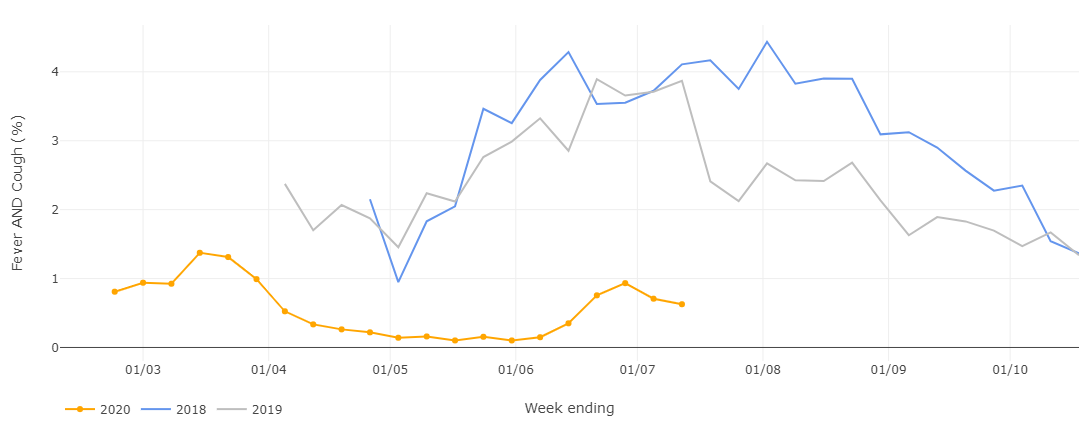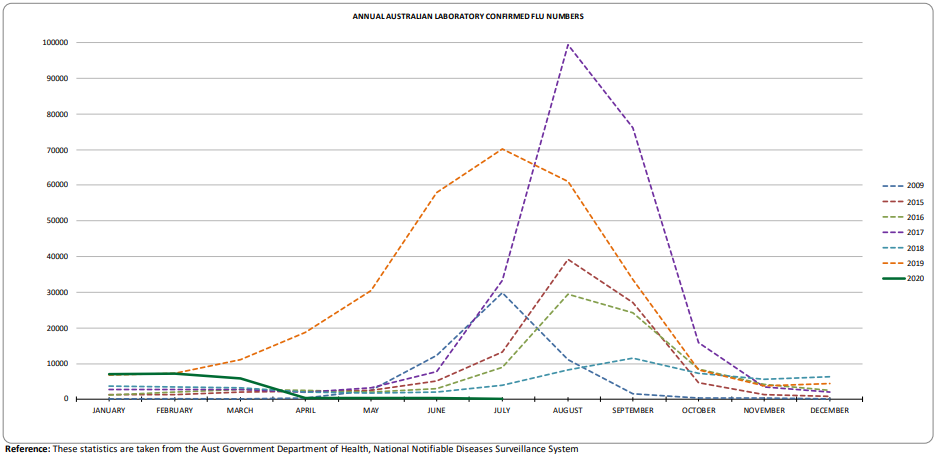COVID-19 restrictions may lead to a significant fall in common winter illnesses like the flu, according to a leading doctor.
Twenty new cases of COVID-19 were reported last night; however, officials have confirmed that the reproductive rate of the virus has fallen in the last week.
There have been concerns that any increase in transmission over the winter months may coincide with the winter flu season and put health services under severe pressure.
On Newstalk Breakfast this morning however, Dr Ray Walley, a member of the GP Expert Advisory Group on COVID-19 said there are causes for optimism coming from other countries.
“There is good news coming from Australia and in New Zealand where I don’t think there have been any recorded cases of flu,” he said. “They are coming to the end of their winter over there.”
“In Australia there has been very little flu. That has been the benefit of the lack of congregation that we have all adhered to, so that is good news.”
 Flutracking Influenza-like illness symptoms. New Zealand Crown Research Institute
Flutracking Influenza-like illness symptoms. New Zealand Crown Research InstituteData from New Zealand indicates that while some people have been reporting flu-like symptoms over the winter period, there has been a huge drop compared to previous years.
Similarly, data from Australia shows a major drop in laboratory confirmed flu cases between April and July.
 Australia Department of Health Lab-confirmed Influenza data. Image: The Immunisation Coalition
Australia Department of Health Lab-confirmed Influenza data. Image: The Immunisation CoalitionDr Walley said winter bugs are inevitable as we get into the colder months; however, we can learn a lot about what we are facing by studying Southern Hemisphere countries.
He said there may have been flu in New Zealand but it has generally not affected central health services.
“What we have got to realise is flu is something that does happen worldwide but it is predominantly in the winter months,” he said.
“If we can greatly reduce the number of flus because of lack of congregation, because we are reducing by keeping social distance, that will be a big benefit.
“For example, what we have also learned is that outbreaks of the mumps that have occurred over the last two years in Cork have gone away – so there are going to be benefits from reduced congregation and keeping social distance in regards to viruses that have existed already of an infectious nature.”
Testing
Dr Walley said anyone who picks up a bug this winter will have to assume they have COVID until proven otherwise – meaning they should not go to work or have contact with others until they can be tested.
“People will have to be sensible,” he said. “If you have any flu-like symptoms – any COVID-like symptoms; anything at all – we will be asking people to assume they have COVID; to contact the GP early, to isolate early so we can plan how we are going to respond.
“We are going to have to continue to assume that people have COVID until proven otherwise.”
Vaccine
Dr Walley was speaking after the Irish man leading the vaccine research at the University of Oxford warned that the majority of people will not be able to access it from some time.
Professor Adrian Hill said the it is unlikely the early stages of production for the “highly promising” Oxford vaccine will be able to keep up with demand.
Dr Walley said Ireland has signed up to a European Commission plan to gives us the same purchasing power as any country in the bloc.
“A lot of the money for developing these vaccines has been provided by the European Commission,” he said.
“We are talking millions and billions so you would expect that they have contracts to ensure that Europe has access to the vaccines they have developed in their own countries.
“Previously the monies provided were provided by corporations or companies but a lot of the monies for developing these vaccines were provided by states and the European Commission so I am optimistic that we certainly will have more chance of access as a result of that than if we had been just 4.7 million people in one country as we are.”









